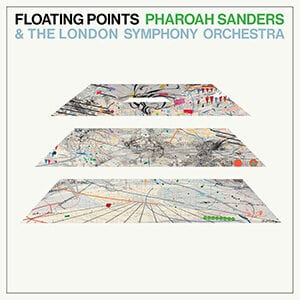
Pharoah Sanders is no stranger to great collaborations. Most famously, he teamed with Alice Coltrane on her legendary LP Journey in Satchidananda, a landmark in the history of spiritual jazz and one of the finest fusions of Eastern and Western influences ever made. Throughout his career, the tenor sax legend has built a reputation for turning every collaboration he’s part of into gold, whether it’s with Alice, her husband John, Ornette Coleman (Chappaqua Suite), or Don Cherry (Symphony for Improvisers).
That’s no small statement—a great musician does not always equal a great collaborator. Plenty of artists who would seem to gel perfectly together never achieve any chemistry. What makes Sanders special is his ability to enliven any piece of music without dominating it. He knows when to get loud and when to get quiet; his reed-blowing always sounds free and uninhibited but never overbearing.
It’s no surprise, then, that his joint effort with Sam Shepherd (aka Floating Points) and the London Symphony Orchestra is a resounding success. Promises is exactly the kind of delicate, understated LP Shepherd and Sanders were born to make. Shepherd’s music is wonky and minimal, inhabiting a tight space between post-rock and cosmic jazz. The rhythmic underbelly of his work, especially on albums like Elaenia, feels decidedly old-school and improvisational, ripe for the loose, off-the-cuff soloing of someone like Sanders.
Promises is essentially one long, continuous piece of music that winds its way across nine tracks—or “movements”, as they are titled. The album is held together by a crisp, seven-note harpsichord flourish that is the one mainstay throughout almost every song. The refrain is interspersed with string, brass, synths, and occasional stretches of silence—on “Movement 1”, before the sax comes in, there are about eight or nine seconds of silence between each flourish. In true Miles Davis fashion, it’s what happens between the notes here that often matters most. Promises lets you linger on every little detail, creating a meditative, liminal atmosphere that is perfect for getting lost in.
Pharoah Sanders’ sax solos are spindly and playful and bear his usual improvisational touch. They offer the perfect counterpart to the measured calm of the orchestral arrangements, veering into free-form territory at times. That is part of the draw of Promises—while most of the album is held together by a single refrain playing repeatedly, what goes on around it feels playful and spontaneous. It’s like an extended jam session. Promises is worlds removed from the intellectual navel-gazing of so much electrojazz fusion. In other hands, an album like this one would’ve been abstract and overly technical. But Shepherd and Sanders breathe so much life into every composition.
The entire recording process for Promises was done in a socially-distanced manner, which is fitting in more ways than one. It’s a sparse, understated record, one where you can really feel the space between each instrument. Certain sounds feel distant—intentionally distant—such as Pharoah Sanders’ singing on “Movement 3”. His vocals here are so low and so delicate that it’s easy to mistake them for his sax. His wordless crooning blends into the mix like any other instrument.
Sparseness aside, there is an explosive energy lurking just under the surface of Promises. The music’s spontaneous nature makes it feel loosely held together, like it could come apart any minute. And sometimes it does. “Movement 7” begins quietly and meditatively but then builds to a giant crescendo of droning synths, triumphant sax, and modulated birdsong. “Movement 9” takes a similar turn. After an intro of spacey ambience and mournful violins, the violins take a turn for the frantic, hitting some of the highest notes on the record. It’s these twists and turns that make even the gentlest pieces on the LP exciting.
All in all, Promises won’t knock you flat, but it is rich, immersive, and ideal for nighttime listening. Few albums utilize silence and space as beautifully as this one. More than five decades since Pharoah Sanders made a name for himself in John Coltrane’s band, and the 80-year-old tenor sax legend has teamed up with the London Symphony Orchestra and one of today’s cutting-edge producers to create a modern jazz classic.

